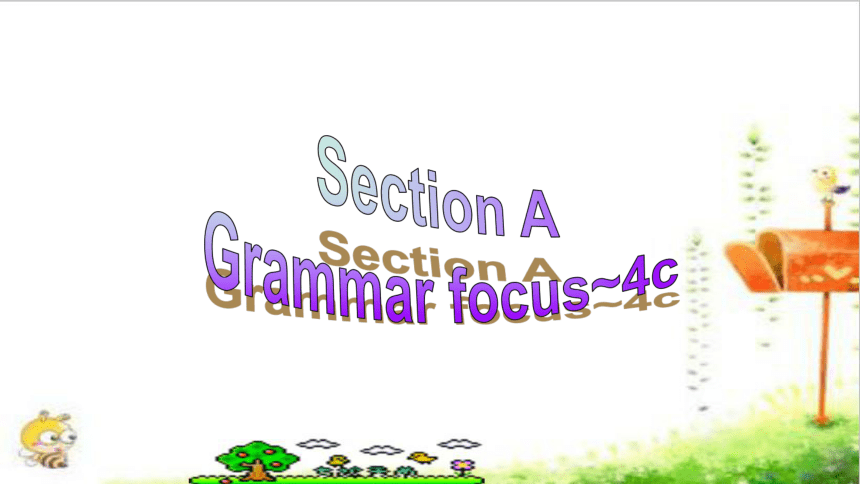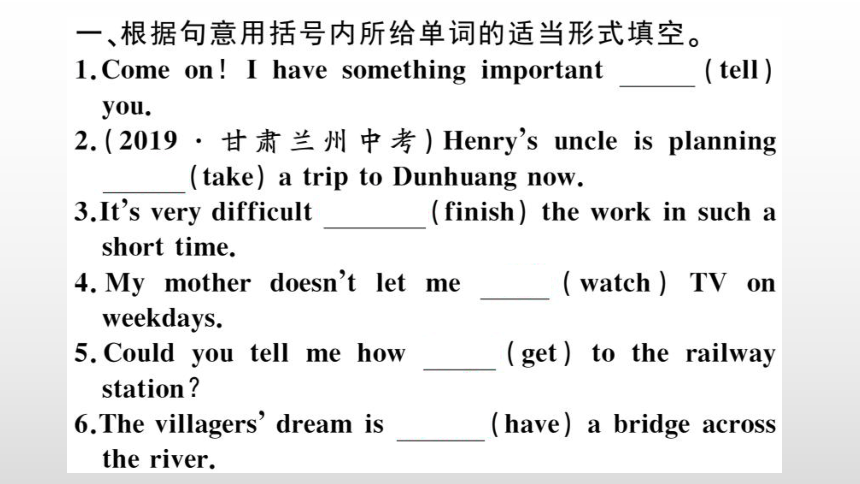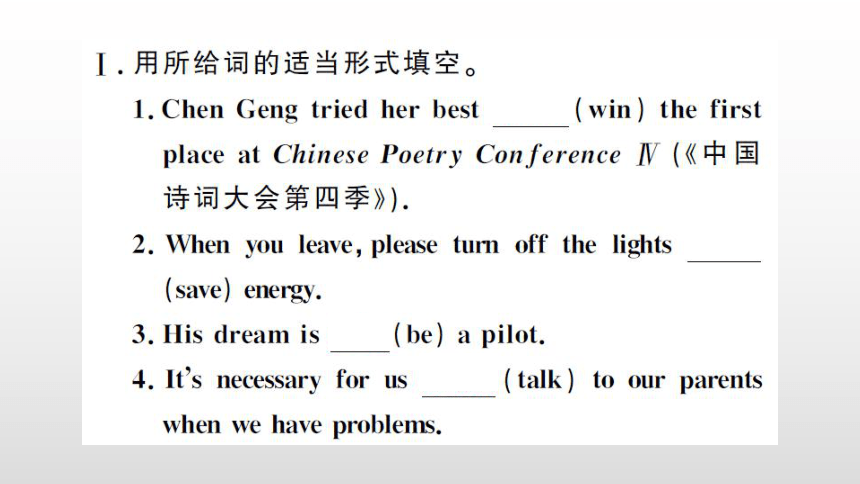Unit2 I'll help to clean up the city parksSection A Grammar focus_4c 课件(21张PPT无素材)
文档属性
| 名称 | Unit2 I'll help to clean up the city parksSection A Grammar focus_4c 课件(21张PPT无素材) |  | |
| 格式 | zip | ||
| 文件大小 | 749.1KB | ||
| 资源类型 | 教案 | ||
| 版本资源 | 人教新目标(Go for it)版 | ||
| 科目 | 英语 | ||
| 更新时间 | 2020-05-03 15:55:13 | ||
图片预览









文档简介
(共21张PPT)
Section A
Grammar focus~4c
Grammar
1. 做动词宾语。常见动词有would like, want, help, learn, hope, decide, volunteer.
动词不定式用法小结
e.g. We don’t want to spent too much money.
我们不想花费太多钱。
2. 作宾语补足语。常见动词有 ask, want, tell, invite, like, hate.
e.g. Mr. Li asked the students to copy the text.
李老师让学生们抄写课文。
3. 作目的状语。
e.g. Jack turned his head around to
look at people.
杰克转过头看向人群。
e.g. Claire missed a great chance to
make a lot of money.
克莱尔错过了一个赚大钱的机会。
4. 作后置定语。
5. 动词help及一些役使动词后面常省略to。
e.g. My mother wouldn’t let me go to
the movie.
妈妈不会让我去看电影的。
一、根据句意,用括号中所给单词的适当形式填空。
1.The Browns decided ________(travel) to Penang in Malaysia.
2.The teacher asked me _________(answer) the question in English.
3.The workers wear dark glasses _________(keep) their eyes safe.
4.Could you tell me what _______ (do) next?
5.Mr. Green told the boy not ________ (come) to school late again.
6.Do they have any good ideas ________ (help) the homeless people?
to travel
to answer
to keep
to do
to come
to help
二、单项选择。
7.We advise parents __ __ their children at home alone.(广东中考)
A.not leave B.not to leave
C.leave D.to leave
8.I was tired out,so I stopped the car __ __ a short rest.(襄阳中考)
A.have B.having C.to have D.had
9.We should do what we can __ __ our English.(锦州中考)
A.improve B.improved
C.to improve D.Improving
10.We have to __ __ the sports meeting because of the bad weather.(吉林中考)
A.put on B.put off
C.put out D.put away
B
C
C
B
一、根据句意,用括号中所给单词的适当形式填空。
1.They wanted _____________ (visit) the West Lake last week.
2.There was no time _________ (eat) breakfast this morning.
3.The policeman told the boys not _________(play) in the street.
4.My father often tells us __________ (save) water in our daily life.
5.We must do everything we can ___________(make) our earth cleaner and cleaner.
6.The boy didn't know how _________(get) to the nearest park.
to visit
to eat
to play
to save
to make
to get
4a
Fill in the blanks with the phrasal verbs in the box.
put up,
hand out,
call up,
cheer up,
come up with, give out,
put off
1. I want to _______ my plan to work in an animal hospital until next summer. I’m too busy with my studies this year.
put off
点拨:由句意“本学期我学业太忙”,可知上文应意为“我想将去动物医院工作的计划推迟到明年夏季”,故空格处意为“推迟”。
2. She hopes to ______ at least five primary schools to ask if they need volunteers for their after-school programs.
call up
点拨:由下文目的状语“to ask…”意“来问是否他们需要志愿者帮助做课外活动。”,可知空格处意为“打电话给”。
点拨:由关键词idea及sick children,可知第一空格处意为“想出”,第二空格处意为“使… …振奋”。
3. Our class is trying to ____________ some ideas to ________ sick children because they are often sad.
come up with
cheer up
4. We decided to ______ signs around the school and ________ notices to tell students about the book sale. We will _______ the money from the sale to homeless people.
put up
hand out
give out
点拨:由关键词signs (告示),notices (通知),及money (钱)可知第一空意为“张贴”,第二空格意为“发放”,第三空意为“捐赠”。
help move do make visit spend
4b
Fill in the blanks with the correct forms of the verbs in the box.
Most people today are only worried about getting good jobs 1.____ lots of money. In their free time, they think about what 2. ____ for fun. However, few people think about what they can do 3. _____ others. There are many people who are less lucky than us. Volunteering our time to help these people is a good way 4. ______
to make
to do
to help
to spend
our free time. For example, we can make plans 5.________ sick children in the hospital or raise money for homeless people. Some people even stop doing their jobs for a few months to a year 6. ________ to another place, like one of the countries in Africa, and help people there.
to visit
to move
language points
sick adj. 生病的;有病的;
e.g. He felt sick before the test.考试前他生病了。
辨析:sick 与 ill
sick 可作定语修饰名词,而ill只能做表语。
e.g. The mother cared for the sick girl day and night.
妈妈日夜照料着生病的女孩。
e.g. Jane was ill yesterday, she didn’t go to school.
昨天简生病了,她没去上学。
language points
?I want to travel alone.(教材P12)我想独自去旅行。
alone作副词,意为“独自;单独”。
My mother sits alone in her room.我母亲独自坐在房间里。
【区分】 lonely与alone
alone作副词,意为“单独;独自”,可位于动词之后修饰动词;还可以作形容词,
意为“单独的”,此时只能作表语。
she likes living alone. 她喜欢一个人住。
表语是回答主语“是什么”或“怎么样”的语法成分,它用来说明主语的身份、特征和状态的,起表述作用。
language points
lonely作形容词,“孤独的,寂寞的”。表示人主观上感到“孤独”,具有感彩。
既可以作表语,也可作定语,作定语时还可表示“偏僻的,荒凉的”。
Sarah felt lonely after her best friend left.
萨拉感到很寂寞,自从他最好的朋友离开后。
He wae taken to a lonely island.他被带到一个荒岛上。
He doesn’t feel lonely when he is alone.他独自一人时不感到寂寞。
定语是用来修饰、限定、说明名词或代词的品质与特征的。
Thank you
Section A
Grammar focus~4c
Grammar
1. 做动词宾语。常见动词有would like, want, help, learn, hope, decide, volunteer.
动词不定式用法小结
e.g. We don’t want to spent too much money.
我们不想花费太多钱。
2. 作宾语补足语。常见动词有 ask, want, tell, invite, like, hate.
e.g. Mr. Li asked the students to copy the text.
李老师让学生们抄写课文。
3. 作目的状语。
e.g. Jack turned his head around to
look at people.
杰克转过头看向人群。
e.g. Claire missed a great chance to
make a lot of money.
克莱尔错过了一个赚大钱的机会。
4. 作后置定语。
5. 动词help及一些役使动词后面常省略to。
e.g. My mother wouldn’t let me go to
the movie.
妈妈不会让我去看电影的。
一、根据句意,用括号中所给单词的适当形式填空。
1.The Browns decided ________(travel) to Penang in Malaysia.
2.The teacher asked me _________(answer) the question in English.
3.The workers wear dark glasses _________(keep) their eyes safe.
4.Could you tell me what _______ (do) next?
5.Mr. Green told the boy not ________ (come) to school late again.
6.Do they have any good ideas ________ (help) the homeless people?
to travel
to answer
to keep
to do
to come
to help
二、单项选择。
7.We advise parents __ __ their children at home alone.(广东中考)
A.not leave B.not to leave
C.leave D.to leave
8.I was tired out,so I stopped the car __ __ a short rest.(襄阳中考)
A.have B.having C.to have D.had
9.We should do what we can __ __ our English.(锦州中考)
A.improve B.improved
C.to improve D.Improving
10.We have to __ __ the sports meeting because of the bad weather.(吉林中考)
A.put on B.put off
C.put out D.put away
B
C
C
B
一、根据句意,用括号中所给单词的适当形式填空。
1.They wanted _____________ (visit) the West Lake last week.
2.There was no time _________ (eat) breakfast this morning.
3.The policeman told the boys not _________(play) in the street.
4.My father often tells us __________ (save) water in our daily life.
5.We must do everything we can ___________(make) our earth cleaner and cleaner.
6.The boy didn't know how _________(get) to the nearest park.
to visit
to eat
to play
to save
to make
to get
4a
Fill in the blanks with the phrasal verbs in the box.
put up,
hand out,
call up,
cheer up,
come up with, give out,
put off
1. I want to _______ my plan to work in an animal hospital until next summer. I’m too busy with my studies this year.
put off
点拨:由句意“本学期我学业太忙”,可知上文应意为“我想将去动物医院工作的计划推迟到明年夏季”,故空格处意为“推迟”。
2. She hopes to ______ at least five primary schools to ask if they need volunteers for their after-school programs.
call up
点拨:由下文目的状语“to ask…”意“来问是否他们需要志愿者帮助做课外活动。”,可知空格处意为“打电话给”。
点拨:由关键词idea及sick children,可知第一空格处意为“想出”,第二空格处意为“使… …振奋”。
3. Our class is trying to ____________ some ideas to ________ sick children because they are often sad.
come up with
cheer up
4. We decided to ______ signs around the school and ________ notices to tell students about the book sale. We will _______ the money from the sale to homeless people.
put up
hand out
give out
点拨:由关键词signs (告示),notices (通知),及money (钱)可知第一空意为“张贴”,第二空格意为“发放”,第三空意为“捐赠”。
help move do make visit spend
4b
Fill in the blanks with the correct forms of the verbs in the box.
Most people today are only worried about getting good jobs 1.____ lots of money. In their free time, they think about what 2. ____ for fun. However, few people think about what they can do 3. _____ others. There are many people who are less lucky than us. Volunteering our time to help these people is a good way 4. ______
to make
to do
to help
to spend
our free time. For example, we can make plans 5.________ sick children in the hospital or raise money for homeless people. Some people even stop doing their jobs for a few months to a year 6. ________ to another place, like one of the countries in Africa, and help people there.
to visit
to move
language points
sick adj. 生病的;有病的;
e.g. He felt sick before the test.考试前他生病了。
辨析:sick 与 ill
sick 可作定语修饰名词,而ill只能做表语。
e.g. The mother cared for the sick girl day and night.
妈妈日夜照料着生病的女孩。
e.g. Jane was ill yesterday, she didn’t go to school.
昨天简生病了,她没去上学。
language points
?I want to travel alone.(教材P12)我想独自去旅行。
alone作副词,意为“独自;单独”。
My mother sits alone in her room.我母亲独自坐在房间里。
【区分】 lonely与alone
alone作副词,意为“单独;独自”,可位于动词之后修饰动词;还可以作形容词,
意为“单独的”,此时只能作表语。
she likes living alone. 她喜欢一个人住。
表语是回答主语“是什么”或“怎么样”的语法成分,它用来说明主语的身份、特征和状态的,起表述作用。
language points
lonely作形容词,“孤独的,寂寞的”。表示人主观上感到“孤独”,具有感彩。
既可以作表语,也可作定语,作定语时还可表示“偏僻的,荒凉的”。
Sarah felt lonely after her best friend left.
萨拉感到很寂寞,自从他最好的朋友离开后。
He wae taken to a lonely island.他被带到一个荒岛上。
He doesn’t feel lonely when he is alone.他独自一人时不感到寂寞。
定语是用来修饰、限定、说明名词或代词的品质与特征的。
Thank you
同课章节目录
- Unit 1 What's the matter?
- Section A
- Section B
- Unit 2 I'll help to clean up the city parks.
- Section A
- Section B
- Unit 3 Could you please clean your room?
- Section A
- Section B
- Unit 4 Why don't you talk to your parents?
- Section A
- Section B
- Unit 5 What were you doing when the rainstorm came
- Section A
- Section B
- Review of Units 1-5
- Unit 6 An old man tried to move the mountains.
- Section A
- Section B
- Unit 7 What's the highest mountain in the world?
- Section A
- Section B
- Unit 8 Have you read Treasure Island yet?
- Section A
- Section B
- Unit 9 Have you ever been to a museum?
- Section A
- Section B
- Unit 10 I've had this bike for three years.
- Section A
- Section B
